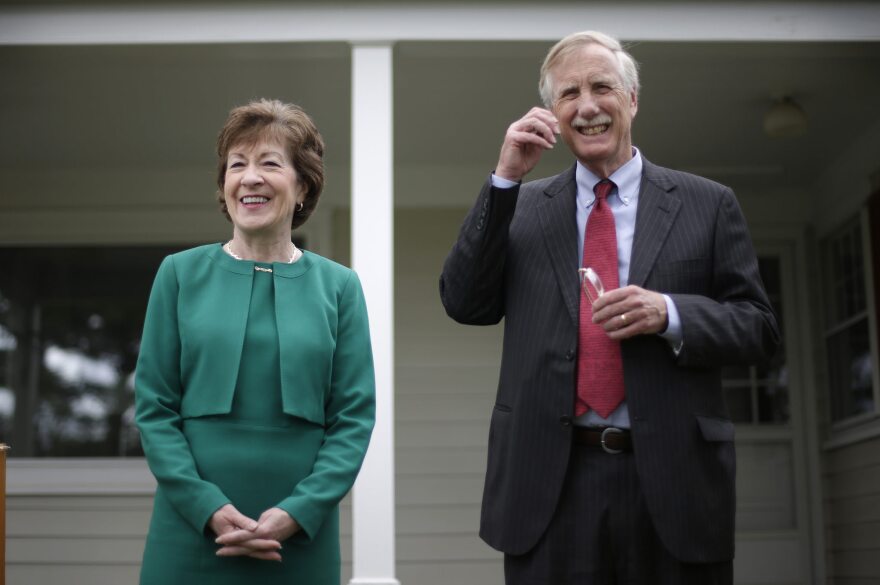Republican Gov. Paul LePage took his campaign against U.S. Sens. Susan Collins, R-Maine, and Angus King, an independent, to a national audience, furthering speculation about his future political ambitions.
In an opinion piece for the Wall Street Journal, LePage blasted Collins and King for their recent votes to deep-six a controversial Republican bill that would have dismantled key parts of the Affordable Care Act, also known as Obamacare.
Collins and King opposed the bill, saying it would have increased deductibles, jeopardized protections for people with pre-existing conditions and stripped thousands of Mainers from their health insurance.
But LePage, who also previously opposed the bill, wrote that the senators’ vote was “downright dangerous,” adding that the senators were more interested in “preening for the cameras” than pursuing meaningful changes to the health care system.
The governor’s WSJ commentary echoed his multi-day broadside against King and Collins. On Tuesday he used his weekly radio address to blast the two senators, as well as his weekly radio appearance on Bangor radio station WVOM.
The radio appearance prompted a response from Collins’s spokeswoman Annie Clark, who noted that the governor originally opposed the Senate health care bill before he supported it.
“Senator Collins met with countless people prior to these votes, including: hundreds of consumers, employers, rural nursing home and hospital executives, insurance regulators and actuaries, and health care providers,” Clark wrote in an email Tuesday. “She believes strongly that she cast the right votes on behalf of the people of Maine. We must now work together on a bipartisan bill that fixes the serious flaws in the ACA and works for all Americans.”
Clark also jabbed LePage’s apparent nostalgia for how U.S. senators were chosen during the 19th Century. Prior to the 17th Amendment, state legislatures elected senators, a process that the governor appeared to endorse in comments he made to WVOM.
“We were surprised to hear the Governor opposes having Senators elected directly by the people of Maine, as they have been for more than 100 years, and would rather go back to the system where the legislature handpicked Senators,” Clark wrote.
King and Collins released a joint statement responding to the governor's WSJ column.
"Every version of the Senate plan would have increased the number of uninsured by millions and weakened important consumer protections. Premiums and out-of-pocket costs—which are already too high—also would have skyrocketed," they wrote. "For example, a 60-year-old couple earning $65,000 in Aroostook County would have faced a premium increase of 40 percent, to $37,291 per year under the Senate plan."
They added, "The Senate plan could also have driven already struggling hospitals and long-term care facilities in Maine out of existence, particularly in our rural areas, causing many patients to lose access to services and many people to lose their jobs."
The governor’s attack against King and Collins came amid speculation about his own political ambitions. For the past year he has repeatedly expressed a desire to challenge King during the 2018 election. That speculation diminished slightly in the spring. LePage told Portland radio station WGAN in April that he didn’t think he would be a very good legislator, and in May, his political advisor released a statement saying LePage will not run for the senate next year.
Nonetheless, LePage has recently said he’s rethinking his decision and may challenge King. On Tuesday he insinuated that someone associated with state Sen. Eric Brakey, an Auburn Republican who already is challenging King, leaked a video of the governor to the Bangor Daily News criticizing Collins during a Somerset County Republican pig roast.
LePage said the resulting news story made him want to run against King.
The governor has also said that he believes Collins will run for governor in 2018, potentially setting up a GOP primary between Maine’s senior senator and LePage’s former health and human services commissioner, Mary Mayhew.
Mayhew launched her gubernatorial bid early this summer, promising to continue the aggressive conservative agenda LePage has attempted to advance since his first term began in 2011.
Collins is one of the most popular politicians in the country. But the governor suggested during the Somerset County event that she could be vulnerable in a Republican primary if his base of supporters voted for someone else - presumably Mayhew.
Collins has not decided if she will pursue a gubernatorial run. She’s expected to make a decision sometime this fall.
Some political observers aren’t convinced LePage wants to run for the Senate and that he is instead angling for a job in the Trump administration.
That speculation was further fueled by a report in the Portland Press Herald, which used the state’s public records law to find that the governor and his staff spent more than $35,000 on luxury hotels, restaurants and travel during repeated trips to Washington, D.C. this year.
LePage was seeking an audience with members of Congress and the Trump administration during those trips.
The paper found that taxpayers paid for most of the trips, including a four-night stay at the Trump International Hotel.



